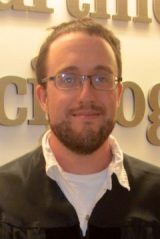 As part of his PhD in Anthropology with a specialization in Political Economy, Daniel Tubb spent more than two years in Colombia conducting fieldwork for his dissertation.
As part of his PhD in Anthropology with a specialization in Political Economy, Daniel Tubb spent more than two years in Colombia conducting fieldwork for his dissertation.
Says Tubb: “As with most anthropologists, my fieldwork was a formative experience and a highlight of my studies.”
Tubb says that one of the challenges of doing fieldwork in Colombia was to find an appropriate place to work. It took him six months to find such a place.
His research looked at the things people do to make a living in the Pacific northwest of Colombia, focusing on gold mining and rural economies. “I explored the linkage between resource extraction and money laundering,” says Tubb. “My dissertation addresses the nexus of the legal and illegal economy through resource extraction.”
During his fieldwork, Tubb spent a lot of time learning how to mine for gold by working with artisanal miners who mix mining with gardening, fishing, hunting, logging and migrant work.
“An unexpected positive was coming back to Carleton and having the luxury of being able to write up my fieldwork for the better part of two years,” continues the PhD candidate.
Tubb, who was one of the first students to graduate this fall with a PhD in Anthropology, also did his MA at Carleton in Political Economy.
“I found an academic community in Political Economy with a perspective I shared and with welcoming professors and students,” says Tubb. “Later, I found a similar community in Anthropology…I had intended to pursue a PhD somewhere else, but Carleton started a new PhD program in Anthropology. I applied and the department accepted my application with a compelling combination of faculty support and funding.”
Tubb acknowledges the research support he has received at Carleton. “Cristina Rojas supervised my MA work, and she was on my doctoral committee. She has been a wonderful and supportive mentor. I would not have had the same appreciation for Anthropology without the guidance of my supervisor Prof. Peter Gose. He pushed me towards an ethnographic perspective. Prof. Blair Rutherford emphasized a concern with Anthropological engagement. In their different ways, each member of my committee shaped my work.”
Tubb is currently a Postdoctoral Visiting Fellow at the Agrarian Studies Program of the MacMillan Center at Yale University. He is funded by the Canadian Social Sciences and Humanities Research Council (SSHRC).
“What I had not realized until I started the process was that, while some universities have their own Postdoctoral funding, you can sometimes arrive with outside funding. Since I pursued my post-graduate studies in Canada, I was able to apply to take the SSHRC funding to the United States.”
He adds that he spent the better part of two months in 2013 honing his SSHRC project.
For the future, Tubb plans on continuing his anthropological research and writing about Colombia. He is hoping to land an academic job in Canada teaching Anthropology, while continuing to publish, engage in new research, work with colleagues, and train undergraduate and graduate students.
Although he was not able to attend Fall Convocation, Tubb has another project on his mind. His son was born over the summer, two weeks after he submitted his dissertation for defence.
“Being a father has been a lot of work, but also an enriching and rewarding experience,” says Tubb. He attributes the completion of his dissertation to supportive colleagues, biweekly writing workshops and the prospect of becoming a father.